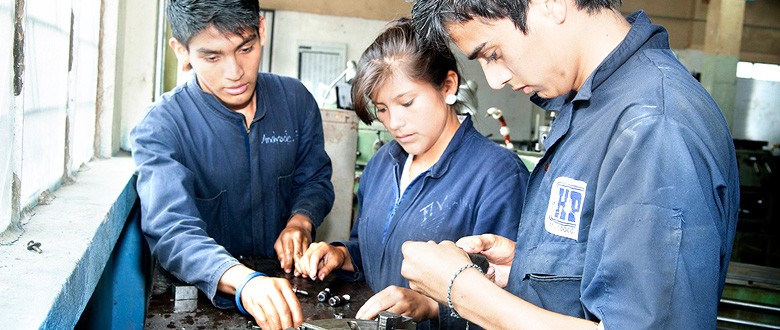
De Nederlandse uitdrukking 'Onbekend is onbemind' is erg relevant als het gaat over het technisch en beroepsonderwijs. María Gracia Fonseca is onderwijsadviseur en communicatiecoördinator bij VVOB in Ecuador. Via gesprekken met collega's in andere landen was het haar opgevallen dat er overal weinig interesse is voor het technisch onderwijs. Dat komt deels doordat de leden van het hogere kader van de onderwijsinstanties doorgaans nooit in aanraking kwamen met het technisch onderwijs tijdens hun eigen opleiding. Dus: 'Onbekend is onbemind'. María Gracia gaat over het thema te rade bij VVOB-consultant Marcelo Paredes en bij Jessica Ormaza van het Ecuadoraans ministerie van Onderwijs.
Worldwide lack of interest
During the TVET Learning Days in March, the VVOB country teams of Rwanda, DR Congo, Suriname and Ecuador discussed the poor conception of the general public about technical education across the globe. Throughout the talks, it became clear that in all countries this was not just a problem amongst students - doubting about choosing technical education - or their parents - hesitant to send their children to technical education, but also a misconception shared by functionaries and authorities in certain departments of our main partners, the ministries of education, expressed by their lack of interest to deepen their knowledge towards or focus projects on this subsector.
But come to think of it, it’s quite logical. During the course of their life, the civil servants in these ministries may have attended some form of pre-school education, they certainly all have passed through primary education. But when they underwent secondary education, paths start to get intricate. Most of the educational experts in the ministries - and in VVOB, for that matter - went on to study science education instead of technical or professional education options before moving on to higher education. Consequently, people are not familiar with this subsector of education… And what is not known, is not loved.
Looking for answers
The Ecuador team therefore asked VVOB consultant Marcelo Paredes and Jessica Ormaza of the Ministry of Education how they became passionate about the topic in spite of not having been familiar with technical education during their own study paths. Marcelo is currently a consultant for VVOB on the public policy project about the National Technical Education System. Ms Ormaza is the National Director of Initial Teacher Development of the Ministry of Education.
For instance, when asked about their preconceptions about technical education, Ms Ormaza mentioned that before being familiar with TVET once she started working on public education, she thought that it was only an option for students with families with limited financial resources. Marcelo Paredes, on the other side, shared that even though he never had any connection with TVET education during his high school years, this was probably because he was not really motivated into studying either a technical or scientific option. Instead, he followed a social sciences career. Yet, his case is noticeable: he admitted that he was not ill prejudiced towards technical education, – even quite the opposite. It always seemed to him that it is an option that needs to be even more encouraged. For him it would certainly bring positive effects on professional development and employment of the general population in Ecuador.
Learning to love
Both for Marcelo Paredes and for Jessica Ormaza, their chance to get to know about technical education was once they started working in public offices, Marcelo for the Ministry of Knowledge and Human Resources and Jessica for the Ministry of Education. They both started to notice that TVET could be approached as a powerful strategy to link student life to professional life. And furthermore, they have discovered even more connections that can be made through technical education. As Marcelo Paredes told us, public policy incentives should be designed so that the government, the educational community and the private sector —specifically those companies in charge of industrial production— could generate links in an appropriate atmosphere.
 Jessica Ormaza has been leading, through the National Direction of Initial Teacher Development and with VVOB’s technical and financial cooperation, a process to develop professional profiles for TVET teachers. These professional profiles have been aligned with several of the Ministry’s strategies to increase the quality of the Ecuadorian Educational System, like the National Standards for Teacher’s Professional Development and the tests designed to support the national concourse to recruit new teachers for public educational institutions.
Jessica Ormaza has been leading, through the National Direction of Initial Teacher Development and with VVOB’s technical and financial cooperation, a process to develop professional profiles for TVET teachers. These professional profiles have been aligned with several of the Ministry’s strategies to increase the quality of the Ecuadorian Educational System, like the National Standards for Teacher’s Professional Development and the tests designed to support the national concourse to recruit new teachers for public educational institutions.
 On the other hand, Marcelo Paredes’ major reason to work on TVET projects is to make this educational alternative regarded as a potent alternative for students. It can strengthen their knowledge while, above all, increase their employment capacities, not only by accessing a certain position in a company, but also by generating alternative incomes for their families. However, for him this does not mean that students who decide upon a technical secondary education, shouldn’t strive for higher education: in fact, he believes it’s quite the opposite, as their TVET experience would enhance their learning outcomes in higher education.
On the other hand, Marcelo Paredes’ major reason to work on TVET projects is to make this educational alternative regarded as a potent alternative for students. It can strengthen their knowledge while, above all, increase their employment capacities, not only by accessing a certain position in a company, but also by generating alternative incomes for their families. However, for him this does not mean that students who decide upon a technical secondary education, shouldn’t strive for higher education: in fact, he believes it’s quite the opposite, as their TVET experience would enhance their learning outcomes in higher education.
Furthermore, Marcelo Paredes believes that TVET and technical higher education can be powerful tools, if properly administered, to contribute to the governmental strategy to promote the transformation of the national productive structure. This strategy focuses on specialising the workforce by capacity building careers that are best aligned with the local contexts and dynamics.
Spreading the love for TVET
So, now that Jessica and Marcelo both know about technical education and love it, they were asked about some of the strategies they would use to socially promote a positive image of this educational sector, especially amongst ministerial teams.
For Jessica Ormaza, the key idea to transmit is that, different from other educational alternatives, TVET permits a quick connection for schools and students with employment and the labour market. This makes it a fundamental tactic for the economic growth of the country.
For Marcelo Paredes, TVET is probably the most viable ‘alternative’ that the Ecuadorian Educational System can use to provide secondary students with the tools to adapt to daily life, citizenship and professional life as soon as they leave the educational system. Putting this fact in the spotlight, is a successful approach to increase the social position of technical education.
In his own words: “It is a pity that technical professions are socially devaluated. This is so contradictory to the fact that they are very much needed in people’s daily life. I remember being a kid and everything in my parents’ house breaking down at one point and the urgent need to find a competent technician to fix those things. Sadly, I think that non-sustainable consumer practices broke up these careers and professions, for people are rapidly replacing their stuff instead of repairing them.” So, one more reason to love the unknown virtues of TVET: it can also contribute to a more sustainable world. And that is something any technical education student, his/her family and community can be very proud of.
María Gracia Fonseca
Education Advisor and Communication Coordinator, VVOB Ecuador
 María Gracia Fonseca was not a TVET student at secondary school. Very much like the people interviewed for this article, she studied Social Sciences. But she was lucky enough to receive technical preparation afterwards, in college, which is why she KNOWS that technical competences are much more that only labor-related. Her work at VVOB sometimes requires that she uses this conviction to help change mindsets and prejudices about TVET, a quest in which she is more than happy to participate.
María Gracia Fonseca was not a TVET student at secondary school. Very much like the people interviewed for this article, she studied Social Sciences. But she was lucky enough to receive technical preparation afterwards, in college, which is why she KNOWS that technical competences are much more that only labor-related. Her work at VVOB sometimes requires that she uses this conviction to help change mindsets and prejudices about TVET, a quest in which she is more than happy to participate.



